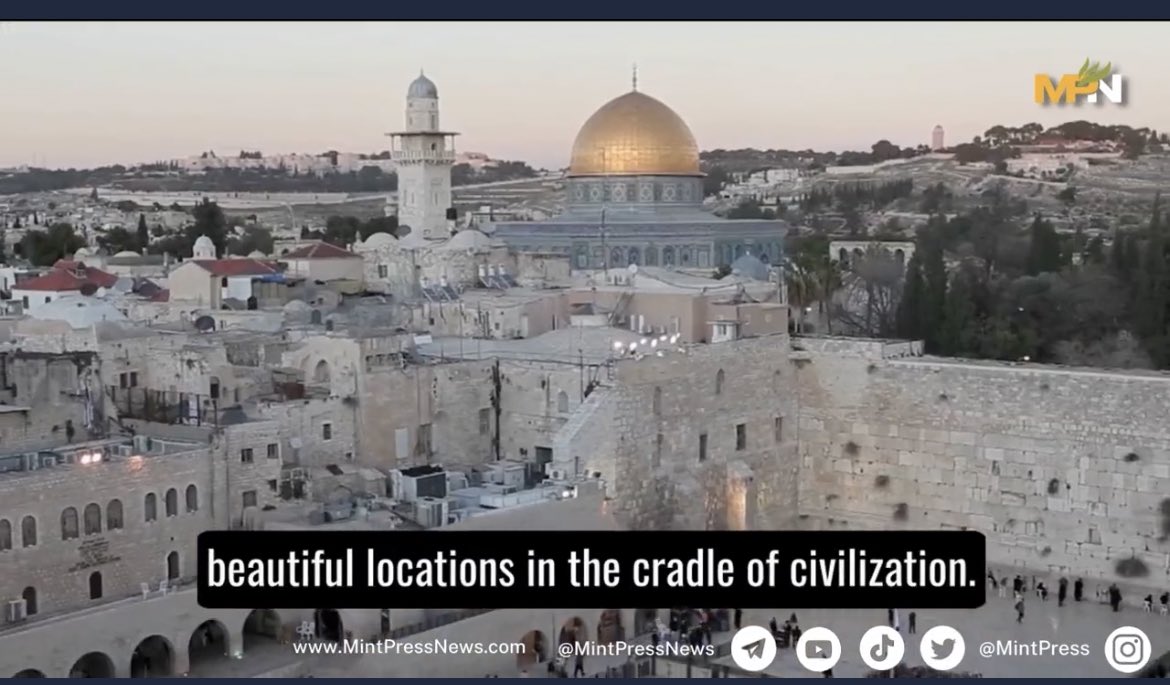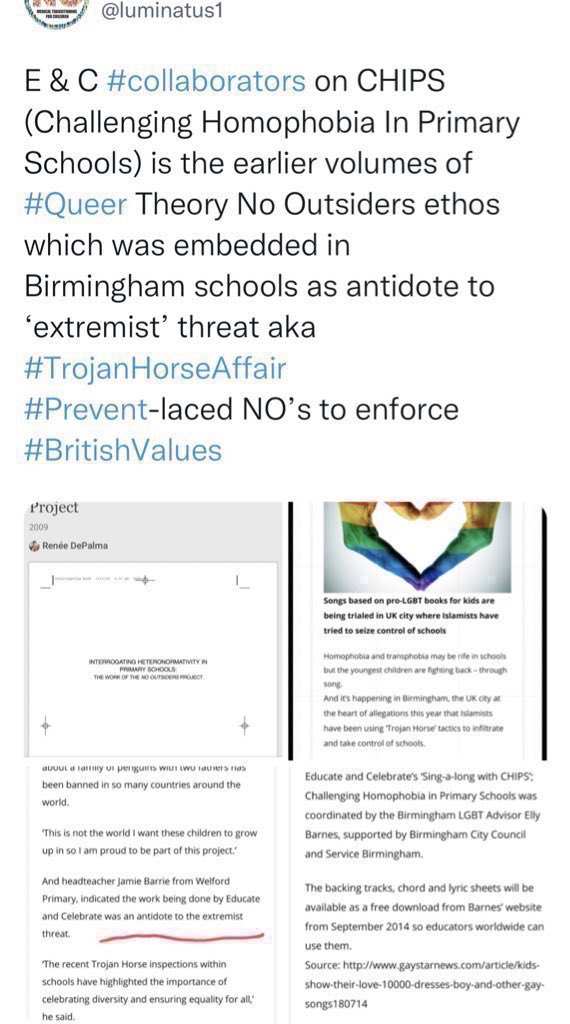
Dangerous Minds’? Deconstructing Counter-Terrorism Discourse, Radicalisation and the ‘Psychological Vulnerability’ of Muslim Children and Young People in Britain
Vicki Coppock and Mark McGovern
Abstract
Current British Government strategies to counter terrorism
Vicki Coppock and Mark McGovern
Abstract
Current British Government strategies to counter terrorism
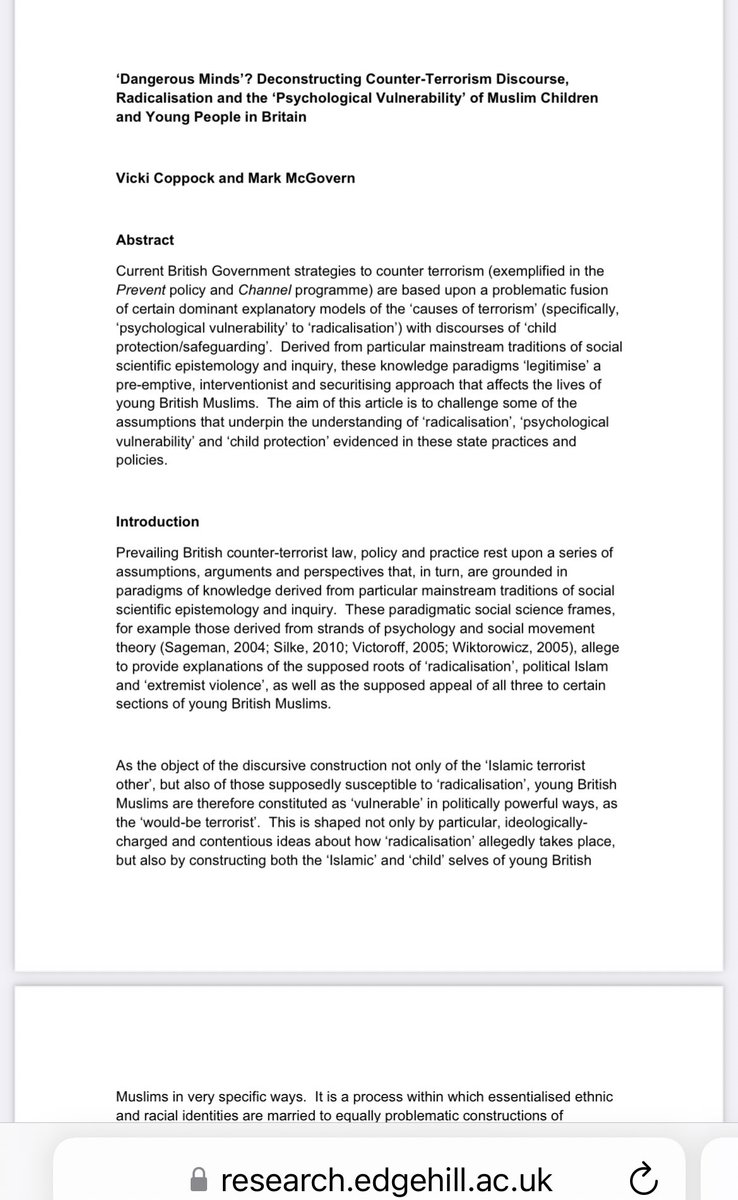
Current British Govt strategies to counter terrorism (exemplified in the #Prevent policy & #Channel programme) are based upon a problematic fusion of certain dominant explanatory models of the ‘causes of terrorism’ (specifically, ‘psychological vulnerability’ to ‘radicalisation’) 

based upon a problematic fusion of certain dominant explanatory models of the ‘causes of terrorism’ (specifically, ‘psychological vulnerability’ to ‘radicalisation’) with discourses of ‘child protection/safeguarding 

Derived from particular mainstream traditions of social scientific epistemology and inquiry,
these knowledge paradigms
‘legitimise’
a pre-emptive, interventionist and securitising approach that affects the lives of young British Muslims.
these knowledge paradigms
‘legitimise’
a pre-emptive, interventionist and securitising approach that affects the lives of young British Muslims.

The aim of this article is to challenge some of the assumptions that underpin the understanding of ‘radicalisation’, ‘psychological vulnerability’
and ‘child protection’ evidenced in these state practices and policies.
and ‘child protection’ evidenced in these state practices and policies.
Introduction
Prevailing British counter-terrorist law, policy and practice rest upon a series of assumptions, arguments & perspectives that, in turn, are grounded in paradigms of knowledge derived from particular mainstream traditions of social scientific epistemology & inquiry
Prevailing British counter-terrorist law, policy and practice rest upon a series of assumptions, arguments & perspectives that, in turn, are grounded in paradigms of knowledge derived from particular mainstream traditions of social scientific epistemology & inquiry
These paradigmatic social science frames, for example those derived from strands of psychology and social movement theory (Sageman, 2004; Silke, 2010; Victoroff, 2005; Wiktorowicz, 2005),
allege to provide explanations of the supposed roots of ‘radicalisation’, political Islam
allege to provide explanations of the supposed roots of ‘radicalisation’, political Islam
allege to provide explanations of the supposed roots of ‘radicalisation’, political Islam and ‘extremist violence’, as well as the supposed appeal of all three to certain sections of young British Muslims.
As the object of the discursive construction not only of the ‘Islamic terrorist other’,
but also of those supposedly susceptible to ‘radicalisation’, young British Muslims are therefore constituted as ‘vulnerable’ in politically powerful ways, as the ‘would-be terrorist’
but also of those supposedly susceptible to ‘radicalisation’, young British Muslims are therefore constituted as ‘vulnerable’ in politically powerful ways, as the ‘would-be terrorist’
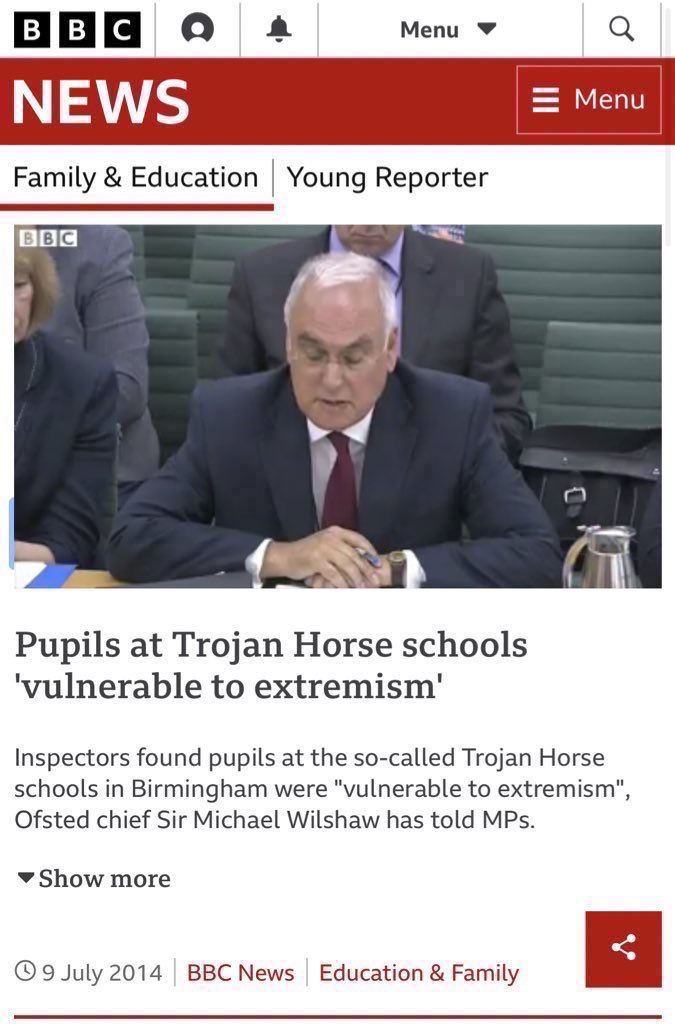
This is shaped not only by particular, ideologically- charged and contentious ideas about how ‘radicalisation’ allegedly takes place,
but also by constructing both the ‘Islamic’ and ‘child’ selves of young British Muslims in very specific ways.
It is a process within which
but also by constructing both the ‘Islamic’ and ‘child’ selves of young British Muslims in very specific ways.
It is a process within which
It is a process within which essentialised ethnic and racial identities are married to equally problematic constructions of ‘childhood’.
Vulnerability is also framed within specific, and again deeply problematic, conceptions of young people’s mental health and well-being
Vulnerability is also framed within specific, and again deeply problematic, conceptions of young people’s mental health and well-being
conceptions of young people’s mental health & well-being.
Devoid of meaningful social & political agency, divorced from the structural circumstances of their lived experiences, & problematised in terms of their mental well-being, young British Muslims are thus rendered as
Devoid of meaningful social & political agency, divorced from the structural circumstances of their lived experiences, & problematised in terms of their mental well-being, young British Muslims are thus rendered as
young British Muslims are thus rendered as appropriate objects for state intervention and surveillance.
Similarly, dominant administrative discourses of ‘child protection’ are securitised and deployed to underpin this interventionist ethos and state surveillance practice
Similarly, dominant administrative discourses of ‘child protection’ are securitised and deployed to underpin this interventionist ethos and state surveillance practice
discourses of ‘child protection’
are securitised and deployed to underpin this interventionist ethos
and state surveillance practice
to produce the ‘young British Muslim’ as both ‘suspect’
and in need of being ‘saved’


are securitised and deployed to underpin this interventionist ethos
and state surveillance practice
to produce the ‘young British Muslim’ as both ‘suspect’
and in need of being ‘saved’



this interventionist ethos & state surveillance practice to produce the ‘young British Muslim’ as both ‘suspect’ & in need of being ‘saved’ (Association of Chief Police Officers (ACPO), undated; Dept for Children, Schools and Families (DCSF), 2010; HM Government, 2012a; 2012b).
Viewing these issues through a critical lens and rooted in a tradition of critical social inquiry,
the aim of this article is to challenge the social scientific paradigms mobilised in this #ideological project, to contest the assumptions they purport to ‘legitimise’,
the aim of this article is to challenge the social scientific paradigms mobilised in this #ideological project, to contest the assumptions they purport to ‘legitimise’,
ideological project, 2contest the assumptions they purport 2 ‘legitimise’, & the arguments thy present concerning the roots of ‘radicalisation’, the nature of ‘vulnerability’ & the need 4 ‘protection’ tht impact via state practices on the lives/identities of young British Muslims
to contest the assumptions they purport to ‘legitimise’, and the arguments they present concerning the roots of ‘radicalisation’, the nature of ‘vulnerability’ and the need for ‘protection’ that impact via state practices on the lives and identities of young British Muslims.
The paper will be divided into 3 parts.
Part 1 will provide a contextual overview of the social and political backcloth framing counter-terrorism law, policy and practice in Britain since 2001, outlining key strategic developments
Part 1 will provide a contextual overview of the social and political backcloth framing counter-terrorism law, policy and practice in Britain since 2001, outlining key strategic developments

counter-terrorism law, policy and practice in Britain since 2001, outlining key strategic developments.
Crucially, it will be argued that these strategies rely upon particular, and perhaps purposefully flexible, narratives of ‘radicalisation’ and ‘extremism’ that, in turn,
Crucially, it will be argued that these strategies rely upon particular, and perhaps purposefully flexible, narratives of ‘radicalisation’ and ‘extremism’ that, in turn,
these strategies rely upon particular, and perhaps purposefully flexible, narratives of ‘radicalisation’ and ‘extremism’ that, in turn,
reinforce the construction of British Muslim youth as a ‘suspect community’,
justifying state surveillance practices and interventions.



reinforce the construction of British Muslim youth as a ‘suspect community’,
justifying state surveillance practices and interventions.




argued that these strategies rely upon particular, & perhaps purposefully flexible, narratives of ‘radicalisation’ & ‘extremism’ that,
in turn, reinforce the construction of British Muslim youth as a ‘suspect community’, justifying state surveillance practices and interventions



in turn, reinforce the construction of British Muslim youth as a ‘suspect community’, justifying state surveillance practices and interventions




Part 2 will outline and critically examine key contributions from within psychology & social movement theory that purport to explain the supposed roots of ‘radicalisation’, political Islam & ‘extremist violence’ & that have directly informed the dvlpmnt of counter-terrorism
development of counter-terrorism & counter-radicalisation technologies & practices in Britain.
Part 3, will involve a textual analysis of official policy documentation & practice guidance on identifying and ‘safeguarding’ ‘vulnerable’ children & young people from being drawn
Part 3, will involve a textual analysis of official policy documentation & practice guidance on identifying and ‘safeguarding’ ‘vulnerable’ children & young people from being drawn
guidance on identifying and ‘safeguarding’ ‘vulnerable’ children and young people from being drawn into terrorism to reveal problematic discursive constructions of ‘childhood vulnerability’ and children’s mental health and well-being that prefigure and inform equally problematic
mental health & well-being that prefigure & inform equally problematic constructions & practices of ‘child protection’/‘safeguarding’.
The role of Eurocentric conceptions of childhood will be highlighted & how these relate 2the construction of the ‘vulnerable young Muslim other’
The role of Eurocentric conceptions of childhood will be highlighted & how these relate 2the construction of the ‘vulnerable young Muslim other’
The role of Eurocentric conceptions of childhood will be highlighted and how these relate to the construction of the ‘vulnerable young Muslim other’ as ‘would-be terrorist’
tiktok.com/@notfortheradi…
tiktok.com/@notfortheradi…
Consideration will be given to the implications of this for children’s practitioners expected to operationalise these official frameworks, specifically in facilitating the extension of Foucauldian practices of governance and discipline of young British Muslims –
in facilitating the extension of Foucauldian practices of governance & discipline of young British Muslims – practices that may be seen to reproduce & perpetuate institutional anti-Muslim racism & Islamaphobia.
Contextualising ‘counter-terrorism’ & ‘counter-radicalisation’ law
Contextualising ‘counter-terrorism’ & ‘counter-radicalisation’ law
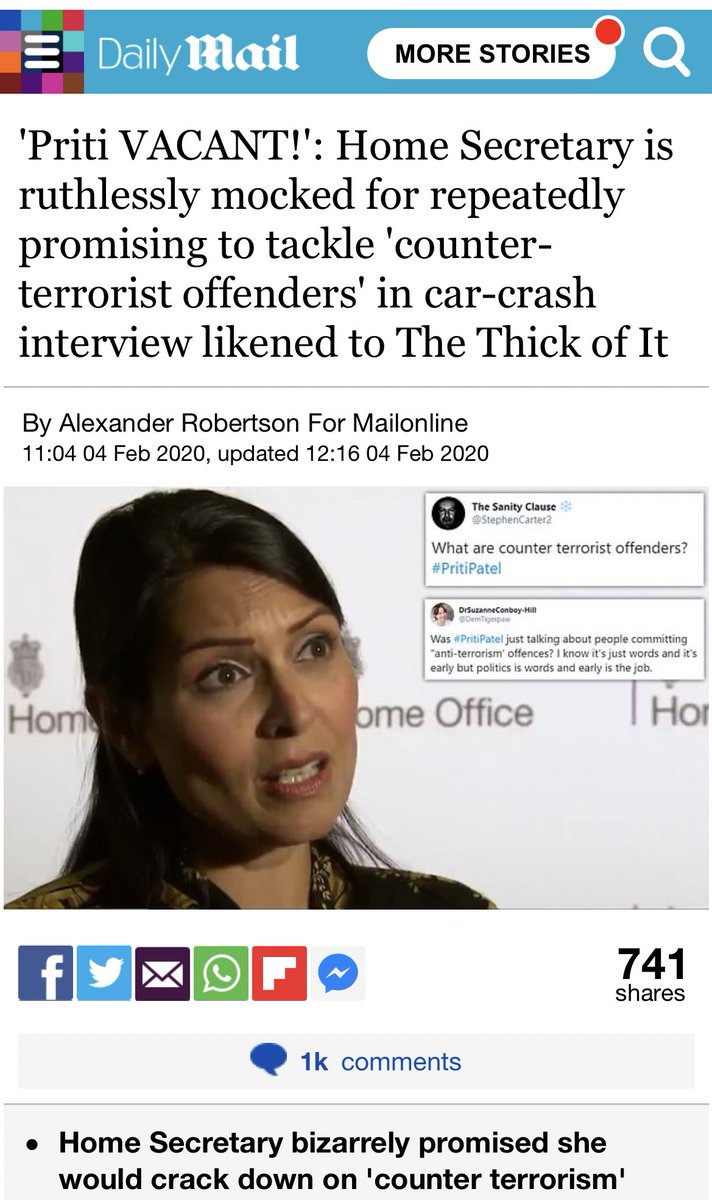
Contextualising ‘counter-terrorism’ and ‘counter-radicalisation’ law, policy and practice in Britain
Against the backdrop of foreign wars, most notably the invasion and occupation of Afghanistan and Iraq, the ‘war on terror’ of the post-9/11 decade gave rise domestically to both
Against the backdrop of foreign wars, most notably the invasion and occupation of Afghanistan and Iraq, the ‘war on terror’ of the post-9/11 decade gave rise domestically to both
the invasion and occupation of Afghanistan and Iraq, the ‘war on terror’ of the post-9/11 decade gave rise domestically to both a swathe of ‘anti-terror’ legislation and policy initiatives and an avalanche of academic literature purporting to ‘explain’ the rise of ‘new terrorism 

In terms of the former, in the UK major legislation included the (pre-9/11) Terrorism Act 2000, the Anti-Terrorism, Crime and Security Act 2001, the Prevention of Terrorism Act 2005, the Terrorism Act 2006 and the Counter- Terrorism Act 2008 (Walker, 2011).
These acts gave sweeping and vastly increased new powers of stop and search, surveillance, arrest and detention, as well as creating new crimes, for example, the dissemination of material deemed to ‘glorify terrorism’.
While ostensibly directed at all forms of ‘extremism’ (including Far Right groups and individuals) such legislative measures also impacted disproportionately, and negatively, upon Muslims in Britain, raising fears of an unstated policy of ‘racial profiling’ in policing practice 

impacted disproportionately, and negatively, upon Muslims in Britain, raising fears of an unstated policy of ‘racial profiling’ in policing practice and the application of the law, and leading many critics to argue that British Muslims were a new ‘suspect community’ 





For example, the decade witnessed a huge increase in the use of the much- expanded ‘stop and search’ powers provided for by section 44 and section 7 of the Terrorism Act 2000.
This included the ability to stop and search without the requirement of reasonable suspicion,
This included the ability to stop and search without the requirement of reasonable suspicion,
This included the ability to stop and search without the requirement of reasonable suspicion, until the European Court declared this in contravention of the European Convention of Human Rights in 2010.
In the aftermath of the 7th July bombings 2005, the number of people stopped under Section 44 jumped from 37,197 in 2006-2007 to 117,278 in 2007-2008.
The No. of Asians stopped under these powers in this period increased 277%, as compared to 185% for white people (Travis, 2009
The No. of Asians stopped under these powers in this period increased 277%, as compared to 185% for white people (Travis, 2009
In their 2010 ruling the European Court noted they were ‘struck by the statistical and other evidence’ that both Black & Asian people were disproportionately affected by these powers (Amnesty International, 2010). One analysis found tht Asians were 42 times more likely than white
analysis found that Asians were 42 times more likely than white people to be stopped and held under Section 7
Dodd, 2011).
Human Rights Watch argued such evidence suggested the ‘police may be engaging in ethnic profiling in deciding whom to stop’ (2010: 1)
Dodd, 2011).
Human Rights Watch argued such evidence suggested the ‘police may be engaging in ethnic profiling in deciding whom to stop’ (2010: 1)
Concerns remain that the resort 2other powers (such as section 60 of the Criminal Justice & Public Order Act) are options tht continue the practice of racial profiling (Townsend, 2012)
Such powers have also impacted disproportionately on young people,& young Muslims in particulr
Such powers have also impacted disproportionately on young people,& young Muslims in particulr
A recent study shows that ethnic minority youth continue to be significantly over-policed via stop and search practices (Medina Ariza, 2013).
Police stops are the most regular contact between the police & young Muslims and have had a profound chilling effect on levels of trust
Police stops are the most regular contact between the police & young Muslims and have had a profound chilling effect on levels of trust
and have had a profound chilling effect on levels of trust and confidence in police-community relations (Choudhury and Fenwick, 2011). Taken with other surveillance and counter-terror measures the cumulative impact of such ‘pervasive scrutiny’ is to create a climate of suspicion
Taken with other surveillance and counter-terror measures the cumulative impact of such ‘pervasive scrutiny’ is to create a climate of suspicion and paranoia that itself contributes to a range of mental health issues and a need on the part of young
Muslims to ‘manage, express
Muslims to ‘manage, express
to create a climate of suspicion and paranoia that itself contributes to a range of mental health issues and a need on the part of young Muslims to ‘manage, express and conceal’ their ‘risky identities’ (Mythen, Walklate and Khan, 2009: 750).
While beyond the scope of this article, this construction of ‘risky’ Muslim identities also rests on the longer- term pathologisation and imagined ‘threat’ of Muslim masculinities and young Muslim men as a ‘new folk devil’ (Alexander, 2000).
Central to this decade-long programme
Central to this decade-long programme
Central to this decade-long programme of ‘anti-terror’ policy-making is CONTEST.
First introduced by the Blair-led Labour Government in 2003, updated in 2006 and again, by the Conservative-Liberal Coalition Government in 2011, CONTEST is the British Government’s overarching CT
First introduced by the Blair-led Labour Government in 2003, updated in 2006 and again, by the Conservative-Liberal Coalition Government in 2011, CONTEST is the British Government’s overarching CT
by the Conservative-Liberal Coalition Government in 2011, CONTEST is the British Government’s overarching counter-terror strategy, the stated goal of which is ‘to reduce the risk to the UK and its interests overseas from terrorism’ (HM Government, 2011a: 40). CO
CONTEST sets out a series of measures and approaches to policy and practice organised into 4 strands; ‘Pursue’, ‘Prevent’, ‘Protect’ and ‘Prepare’.
Perhaps the most contentious of these is Prevent which, as the name suggests, constitutes the ‘preventative strand’


Perhaps the most contentious of these is Prevent which, as the name suggests, constitutes the ‘preventative strand’
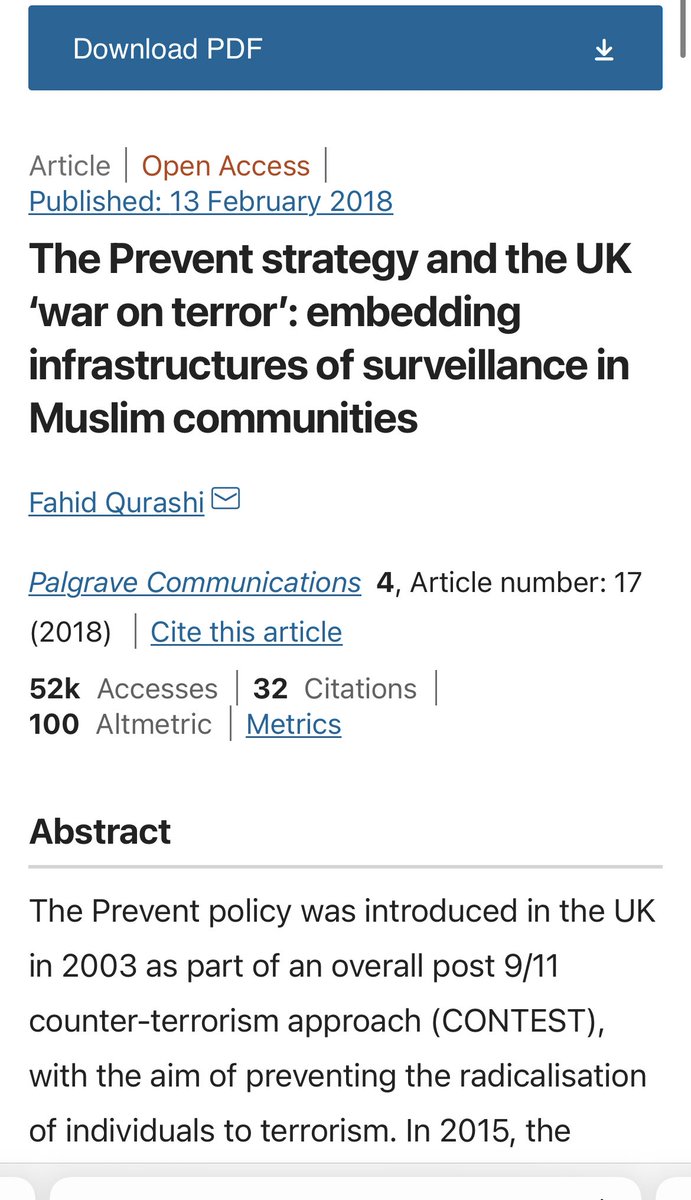


Perhaps the most contentious of these is Prevent which, as the name suggests, constitutes the ‘preventative strand’ of the Government’s strategy
with a self-declared aim to ‘stop people becoming terrorists or supporting terrorism’ (HM Government, 2011b: 6).
with a self-declared aim to ‘stop people becoming terrorists or supporting terrorism’ (HM Government, 2011b: 6).
The process whereby people either become terrorists or come to support terrorism is understood as one of ‘radicalisation’ and thus ‘preventing radicalisation’ is the central platform of this agenda (Jackson, 2009; Kundnani 2012)
Kundnani argues that ‘the concept of radicalisation has become the master signifier of the late “war on terror”’ (2012: 3) & provided a ‘vehicle for policy- makers’ who required a language through which they could discuss the supposed ‘causes of terrorism’ while at the same time
cld discuss the supposed ‘causes of terrorism’ while at the same time delimiting the boundaries of what it was permissible 2include in any explanatory framework (2012: 4). A focus on ‘radicalisation’ establishes the a priori assumption that the search 4 the ‘causes of terrorism’
focus on ‘radicalisation’ establishes the a priori assumption that the search for the ‘causes of terrorism’ is essentially to be found at the level of the attitudes and actions of the individual, the task at hand therefore established as the ‘rooting out of future terrorists 



the task at hand therefore established as the ‘rooting out of future terrorists rather than what might be thought of as root causes’ (McCulloch and Pickering, 2009: 629).
There are several problems with the idea of radicalisation, not least of which is a distinct lack of clarity
There are several problems with the idea of radicalisation, not least of which is a distinct lack of clarity
a distinct lack of clarity as to what it actually means (Mandel, 2009; Richards, 2011). Such open-ended vagueness may not, however, be entirely unintentional, allowing as it does for the re-construction, re-interpretation and re-articulation of what constitutes ‘radicalisation’
Such open-ended vagueness may not, however, be entirely unintentional, allowing as it does for the re-construction, re-interpretation & re-articulation of what constitutes ‘radicalisation’ & the potential widening of a net of applicability to various individuals, groups,
of what constitutes ‘radicalisation’ & the potential widening of a net of applicability 2various individuals, groups, attitudes & actions.
Certainly, while there was a significant degree of continuity between the approach to CONTEST & Prevent between the Labour & Coalition Govt
Certainly, while there was a significant degree of continuity between the approach to CONTEST & Prevent between the Labour & Coalition Govt
a significant degree of continuity between the approach to CONTEST and Prevent between the Labour and Coalition Governments, one important shift in the 2011 CONTEST III document was the identification of ‘non-violent extremism’ as crucial to process of ‘radicalisation’ 





one important shift in the 2011 CONTEST III document was the identification of ‘non-violent extremism’ as crucial to process of ‘radicalisation’
As with the idea of ‘radicalisation’, ‘“extremism” is a vague concept that is easily exploited to demonise anyone whose opinions are
As with the idea of ‘radicalisation’, ‘“extremism” is a vague concept that is easily exploited to demonise anyone whose opinions are

As with the idea of ‘radicalisation’, ‘“extremism” is a vague concept that is easily exploited to demonise anyone whose opinions are radically different’ (Institute of Race Relations, 2010: 79).
The worrying nature of the scope of a term such as ‘radicalisation’ might be judged



The worrying nature of the scope of a term such as ‘radicalisation’ might be judged
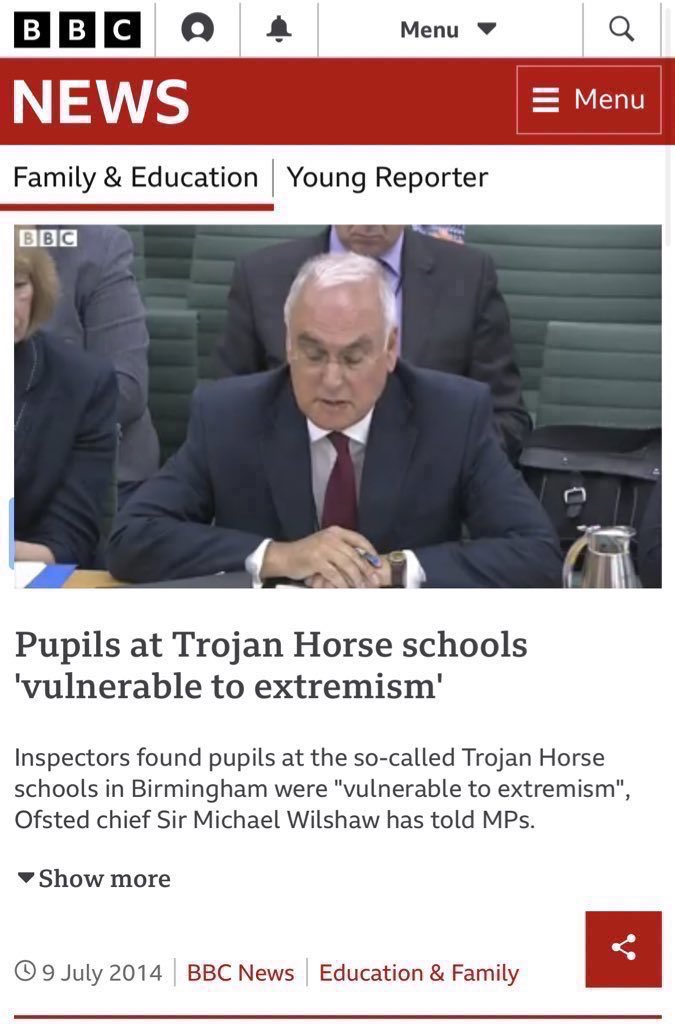



The worrying nature of the scope of a term such as ‘radicalisation’ might be judged by the definition provided by Anja Dalgaard- Nielsen (Director of the Preventative Security Deptof the Danish Security & Intelligence Service) one of the counter-terror experts cited as a key
key authority in Prevent (HM Govt, 2011b: 17).
A #radical is understood as a person harbouring a deep-felt desire for fundamental socio-political change and radicalisation is understood as a growing readiness to pursue and support far-reaching changes in society that conflict



A #radical is understood as a person harbouring a deep-felt desire for fundamental socio-political change and radicalisation is understood as a growing readiness to pursue and support far-reaching changes in society that conflict




A #radical is understood as a person harbouring a deep-felt desire for fundamental socio-political change & radicalisation is understood as a growing readiness to pursue & support far-reaching changes in society that conflict with, or pose a direct threat to, the existing order 







Notably, it is a definition in which no reference to advocating or using violence is felt necessary to count someone as a ‘radical’.
The Prevent strategy understands that ‘ideology is a central factor in the radicalisation process’ (HM Government, 2011: 40-44)
The Prevent strategy understands that ‘ideology is a central factor in the radicalisation process’ (HM Government, 2011: 40-44)
https://twitter.com/luminatus1/status/1489305862502031361
The Prevent strategy understands that ‘ideology is a central factor in the radicalisation process’ (HM Government, 2011: 40-44)
Ofsted gave Best Practice to Queer Theory project Educate & Celebrate whose activists SAY its antidote to counter the ‘extremist’ threat in Birmingham



Ofsted gave Best Practice to Queer Theory project Educate & Celebrate whose activists SAY its antidote to counter the ‘extremist’ threat in Birmingham




The Prevent strategy understands that ‘ideology is a central factor in the radicalisation process’ (HM Government, 2011: 40-44).
As a result, one of its key objectives is to ‘respond to the ideological challenge of terrorism’ by undertaking ‘counter-ideological work’ designed
As a result, one of its key objectives is to ‘respond to the ideological challenge of terrorism’ by undertaking ‘counter-ideological work’ designed
by undertaking ‘counter-ideological work’ designed to ensure that there should be ‘no ungoverned spaces in which extremism is allowed to flourish’ (HM Government, 2011: 9).
#BritishValues Queered aka counter ideological work
‘No ungoverned spaces in which extremism…’



#BritishValues Queered aka counter ideological work
‘No ungoverned spaces in which extremism…’




‘Radicalisation’ here stands as a particular model for ‘explaining’ the causes of terrorism; understood as a process whereby ‘extremist ideas’ are propagated & disseminated by key activists & thinkers who there4 ‘radicalise’ others cos of their ‘vulnerabilities’ to such a message
who therefore ‘radicalise’ others because of their ‘vulnerabilities’ to such a message.
Identifying the nature of such ‘vulnerabilities’ therefore also emerges as a crucial means of preventing ‘radicalisation’.



Identifying the nature of such ‘vulnerabilities’ therefore also emerges as a crucial means of preventing ‘radicalisation’.




Following from this, the other identified key objectives are to prevent individuals being drawn into ‘extremism’
and to diminish the ‘risks of radicalisation’ within a number of institutional settings (including, notably, schools, colleges and universities).



and to diminish the ‘risks of radicalisation’ within a number of institutional settings (including, notably, schools, colleges and universities).




To this end, a core component of Prevent, and at the forefront of the Government’s ‘anti- radicalisation’ work, is the Channel programme - overseen by the Office for Security and Counter-Terrorism in the Home Office (HM Government, 2010; 2012a).
Originally set up in 2007, Channel involves the identification of individuals in England and Wales deemed to be vulnerable to recruitment to extremism.
It is a multi-agency programme that relies upon the vigilance and cooperation of social workers, youth workers, health workers
It is a multi-agency programme that relies upon the vigilance and cooperation of social workers, youth workers, health workers
youth workers, health workers and teachers in assisting the local police in identifying those ‘at risk of extremism’.
These individuals are then referred for a programme of intervention ‘tailored to their needs’ aimed at stemming their journey towards extremis
4 year radical👇



These individuals are then referred for a programme of intervention ‘tailored to their needs’ aimed at stemming their journey towards extremis
4 year radical👇




individuals are then referred for a programme of intervention ‘tailored to their needs’ aimed at stemming their journey towards extremism.
From 2007–2010 Channel practitioners identified 1,120 individuals as being on a pathway to radicalisation.
From 2007–2010 Channel practitioners identified 1,120 individuals as being on a pathway to radicalisation.

From 2007–2010 Channel practitioners identified 1,120 individuals as being on a pathway to radicalisation.
Although the programme primarily targets 15 -24-year-olds, 290 of those identified were under 16 years old and fifty-five were under 12
Although the programme primarily targets 15 -24-year-olds, 290 of those identified were under 16 years old and fifty-five were under 12
While, in theory, CONTEST, Prevent &Channel are declared to be directed at tackling all forms of ‘radicalisation’ and ‘extremism’, including Far Right activities, it is surely significant tht of those identified as being on a pathway to extremism, over 90% were Muslim (ACPO, 2011
In its 2013 annual report on Strategy for Countering Terrorism the UK government indicated that between January 2007 and April 2012 more than 2,500 referrals were made to Channel & over 500 people had received ‘support’, although no breakdown according to age was provided (HM Gov
The kinds of ‘support’ given to individuals following referral include: life skills; mentoring support; anger management; constructive pursuits; education skills; careers; family support; health awareness; housing support, drugs and alcohol awareness.
In 2010-11 Prevent was revised & its scope & focus extended. Since then, local authorities have been required 2merge Prevent into other aspects of their work, inclu. child protection. Channel has also been extended & is now firmly embedded within formal children’s ‘safeguarding’
Social Science in the Service of the State: The Psychologisation of Dissent
The conceptualisation of ‘radicalisation’, ‘extremism’ & the explanatory framework for ‘terrorism’ evident in Prevent & Channel rests upon particular social scientific paradigms that evidence what might
The conceptualisation of ‘radicalisation’, ‘extremism’ & the explanatory framework for ‘terrorism’ evident in Prevent & Channel rests upon particular social scientific paradigms that evidence what might
particular social scientific paradigms that evidence what might be understood as the ‘psychologisation of social problems’
As noted earlier, alongside the rise in counter-terror laws & invasive policies, the post-9/11 period has seen an explosion of academic literature on terror
As noted earlier, alongside the rise in counter-terror laws & invasive policies, the post-9/11 period has seen an explosion of academic literature on terror
explosion of academic literature on terrorism and counter-terror practice.
These twin processes are intimately interlinked. Overwhelmingly, academic studies of the nature and ‘causes’ of terrorism, and particularly of what has come to be known as ‘new terrorism’, have tended to
These twin processes are intimately interlinked. Overwhelmingly, academic studies of the nature and ‘causes’ of terrorism, and particularly of what has come to be known as ‘new terrorism’, have tended to
known as ‘new terrorism’, have tended to focus on approaches to the subject that have in turn provided an underpinning intellectual rationale for state policy
As Kundnani argues, very much to the fore are analyses that emphasise ‘cultural & psychological predispositions’
As Kundnani argues, very much to the fore are analyses that emphasise ‘cultural & psychological predispositions’
to the fore are analyses that emphasise ‘cultural & psychological predispositions’ alongside small group &social network dynamics tht,
if identified, can provide state officials with a supposedly scientific basis 4 ‘indicators of risk’ of ‘vulnerability to radicalisation’ (2012:
if identified, can provide state officials with a supposedly scientific basis 4 ‘indicators of risk’ of ‘vulnerability to radicalisation’ (2012:
if identified, can provide state officials with a supposedly scientific basis for ‘indicators of risk’ of ‘vulnerability to radicalisation’ (2012: 10)
The result has been a discernible shift away from the examination of the political context of acts of terrorism towards a search
The result has been a discernible shift away from the examination of the political context of acts of terrorism towards a search
a discernible shift away from the examination of the political context of acts of terrorism towards a search for social and psychological factors contributing to the acquisition of a ‘terrorist mind-set’ (Moghaddam, 2005; Sageman, 2008; Wiktorowicz, 2005).
Such approaches have also reflected wider academic and intellectual trends - specifically a general growing pre-occupation and cultural expansion of the categories of ‘psychological vulnerability’ in a wide range of areas of contemporary social life (Furedi, 2003 McLaughlin, 2010
‘Emotional dysfunction’ and emotion-based explanations have come to dominate much public discourse on everything from racism and poverty to the environment and the causes of war, indeed, ‘of virtually every form of social breakdown’ (Furedi, 2003: 26).
The result has been a wholesale recasting of ‘social & cultural problems as psychological ones’ (Furedi, 2003: 27).
One important consequence (evident, for example, in the model of ‘therapeutic governance’ that has accompanied western military intervention in places like the
One important consequence (evident, for example, in the model of ‘therapeutic governance’ that has accompanied western military intervention in places like the
evident, for example, in the model of ‘therapeutic governance’ that has accompanied western military intervention in places like the Former Yugoslavia and Iraq) is the denial of political agency through people being both ‘racialised’ and ‘pathologised’
In turn, this ‘psychologisation of social problems’ has been very much in evidence in the development of policies around children (Burman, 2012; Coppock, 2011).
In this sense, there is a parallel process evident with the Channel programme of the adoption and co-option
In this sense, there is a parallel process evident with the Channel programme of the adoption and co-option
there is a parallel process evident witChannel programme of the adoption and co-option of the problematic conceptualisation of children and young people by the state that also rests upon certain dominant strands of knowledge production that regulate the ‘spaces of childhood’
certain dominant strands of knowledge production that regulate the ‘spaces of childhood’ more generally.
It is therefore necessary to critically reflect further upon the role of social science in this policy-making project, to explore the discourses, logics and knowledge claims
It is therefore necessary to critically reflect further upon the role of social science in this policy-making project, to explore the discourses, logics and knowledge claims
the role of social science in this policy-making project, 2explore the discourses, logics & knowledge claims of these twin strands of (primarily academic) inquiry that, taken together, shape this figure of ‘vulnerable young Muslim Other’ ripe for state surveillance & intervention
The notion of inherent childhood vulnerability, bolstered by the child’s right to protection enshrined in the UNCRC and The Children Act 1989 is already hegemonic in child welfare theory practice, providing the legitimacy for child protection safeguarding practices in general
The coupling of vulnerability to radicalisation discourse with such a powerful overarching protectionist discourse & legislative framework provides a built-in resistance to questioning the legitimacy of enhanced state surveillance practices & interventions w young British Muslims
it is tantamount to heresy to speak against such practices since their benevolence ‘in the best interests of children’ is automatically assumed.
Thus authoritarian state practices (re-framed as ‘quasi- egalitarian’ interventions) ‘move over time to become covert normalisation
Thus authoritarian state practices (re-framed as ‘quasi- egalitarian’ interventions) ‘move over time to become covert normalisation
Thus authoritarian state practices (re-framed as ‘quasi- egalitarian’ interventions) ‘move over time to become covert normalisation such that those who do not fit the norms are rendered deficient or pathological’ (Burman, 2012: 431). Moreover, the re-framing of these intervention
the re-framing of these interventions within protectionist ‘children’s rights’ discourse distorts & disrespects notions of children & young people’s participation rights, in the interest of the state &, as Burman argues, ‘illustrates the discretionary character of the contemporar
‘children’s rights’ discourse distorts & disrespects notions of children & young people’s participation rights, in the interest of the state
.. interest of the state and, as Burman argues, ‘illustrates the discretionary character of the contemporary neoliberal emphasis

.. interest of the state and, as Burman argues, ‘illustrates the discretionary character of the contemporary neoliberal emphasis


Discretionary character of the contemporary
neoliberal emphasis on freedom, autonomy and choice as being premised on making the ‘right’ choices’ (2012: 430)


neoliberal emphasis on freedom, autonomy and choice as being premised on making the ‘right’ choices’ (2012: 430)



most concern in relation to the focus of this paper is that, despite their fundamental shortcomings, such approaches are currently being used to provide the intellectual justification & the technological ‘know-how’ for normalising state practices of discipline & social control of 


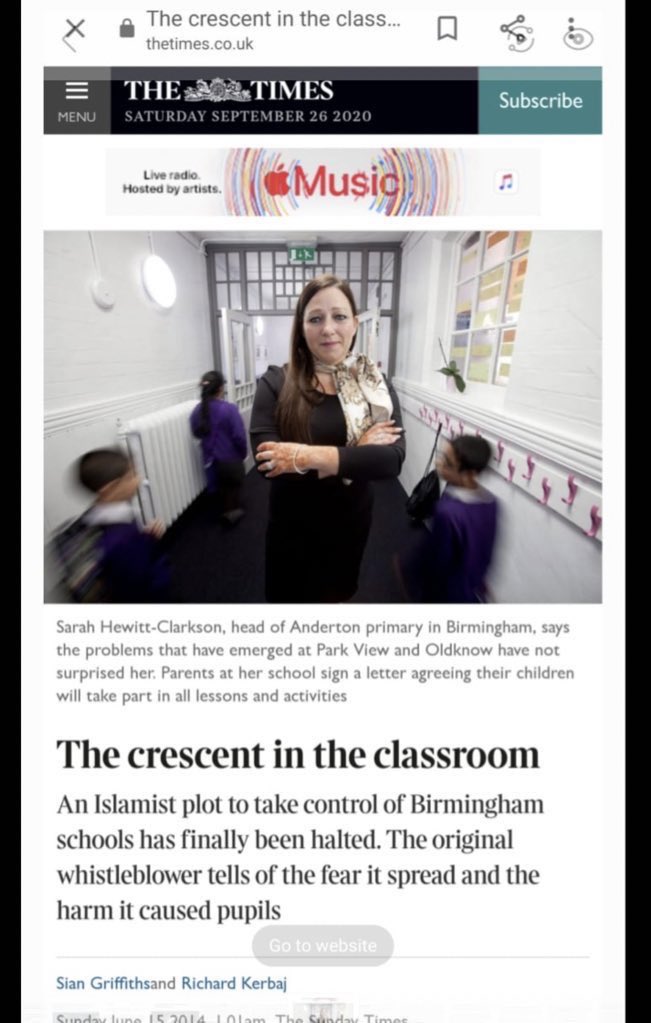


the intellectual justification..
for normalising state practices of
discipline & social control of Muslim
children and young people – all in the
name of ‘safeguarding’ them
‘Help your children become human’ expert Sarah Hewitt-Clarkson
3-11yr old Educated Eichmanns



for normalising state practices of
discipline & social control of Muslim
children and young people – all in the
name of ‘safeguarding’ them
‘Help your children become human’ expert Sarah Hewitt-Clarkson
3-11yr old Educated Eichmanns




the intellectual justification..
for normalising state practices of
discipline & social control of Muslim
children and young people – all in the
name of ‘safeguarding’ them
Islam reformer SHC says about hijab not being equal practice boys & girls
Ofsted Chief in tow
for normalising state practices of
discipline & social control of Muslim
children and young people – all in the
name of ‘safeguarding’ them
Islam reformer SHC says about hijab not being equal practice boys & girls
Ofsted Chief in tow

the intellectual justification..
for normalising state practices of
discipline & social control of Muslim
children and young people – all in the
name of ‘safeguarding’ them
Muscular Liberalism -#Prevent Watch Case
for normalising state practices of
discipline & social control of Muslim
children and young people – all in the
name of ‘safeguarding’ them
Muscular Liberalism -#Prevent Watch Case
the intellectual justification..
for normalising state practices of
discipline & social control of Muslim
children and young people – all in the
name of ‘safeguarding’ them


for normalising state practices of
discipline & social control of Muslim
children and young people – all in the
name of ‘safeguarding’ them



the intellectual justification..
for normalising state practices of
discipline & social control of Muslim
children and young people – all in the
name of ‘safeguarding’ them
for normalising state practices of
discipline & social control of Muslim
children and young people – all in the
name of ‘safeguarding’ them

the intellectual justification..
for normalising state practices of
discipline & social control of Muslim
children and young people – all in the
name of ‘safeguarding’ them



for normalising state practices of
discipline & social control of Muslim
children and young people – all in the
name of ‘safeguarding’ them




‘Safeguarding’ practices employed under the rubric of Prevent and Channel also pose significant concerns for the civil liberties of Muslim children and youth.
For example, while the Home Office strongly denies the accusation that practitioners are obliged to routinely share
For example, while the Home Office strongly denies the accusation that practitioners are obliged to routinely share
For example, while the Home Office strongly denies the accusation that practitioners are obliged to routinely share information about the children and young people they work with, many have expressed concern about the amount of detailed information they are encouraged to collect
many have expressed concern abt the amount of detailed info they are encouraged to collect about the lives of young Muslims & the extent to which they are expected to engage in the monitoring, surveillance al& mapping of Muslim communities on behalf of the State (Kundnani, 2009)
This is demonstrated in research interviews with practitioners reported by the Institute of Race Relations in its Evidence to the UK Parliamentary Select Committee Inquiry on Preventing Violent Extremism:
“If there are specific individuals at risk you would support them anyway
“If there are specific individuals at risk you would support them anyway
“If there are specific individuals at risk you would support them anyway out of a duty of care.
But the local Prevent Board is asking for a more general map of Muslim communities.
I make confidentiality promises to you people, which I shouldn’t break unless
But the local Prevent Board is asking for a more general map of Muslim communities.
I make confidentiality promises to you people, which I shouldn’t break unless
“I make confidentiality promises to young people, which I shouldn’t break unless it is a matter of child protection or a criminal act.” (Youth Project Manager, cited in Institute of Race Relations, 2010: 7
This practitioner alludes to a fundamental problem facing all practitioners – the problems that arise when the state drives policy and practice in ways that are inconsistent with the professional norms and core values of their profession.
This article has demonstrated that, as currently formulated & practised, counter-terrorism & counter-radicalisation strategies
aimed at safeguarding vulnerable children & young people from extremism are ill conceived,
aimed at safeguarding vulnerable children & young people from extremism are ill conceived,
Counter radicalisation strategies aimed at safeguarding vulnerable children and young people from extremism are ill conceived, unreliable and give legitimacy to unjustifiable regulation and social control of young British Muslims 







Counter radicalisation strategies aimed at safeguarding vulnerable children & young people from extremism are ill conceived, unreliable & give legitimacy to unjustifiable regulation and social control of young British Muslims
Hearts & Minds
‘Get in there first’
Queer Theory

Hearts & Minds
‘Get in there first’
Queer Theory


Counter radicalisation strategies aimed at safeguarding vulnerable children & young people from extremism are ill conceived, unreliable & give legitimacy to unjustifiable regulation & social control of young British Muslims
#Prevent-laced No Outsiders
Shaping social values..

#Prevent-laced No Outsiders
Shaping social values..

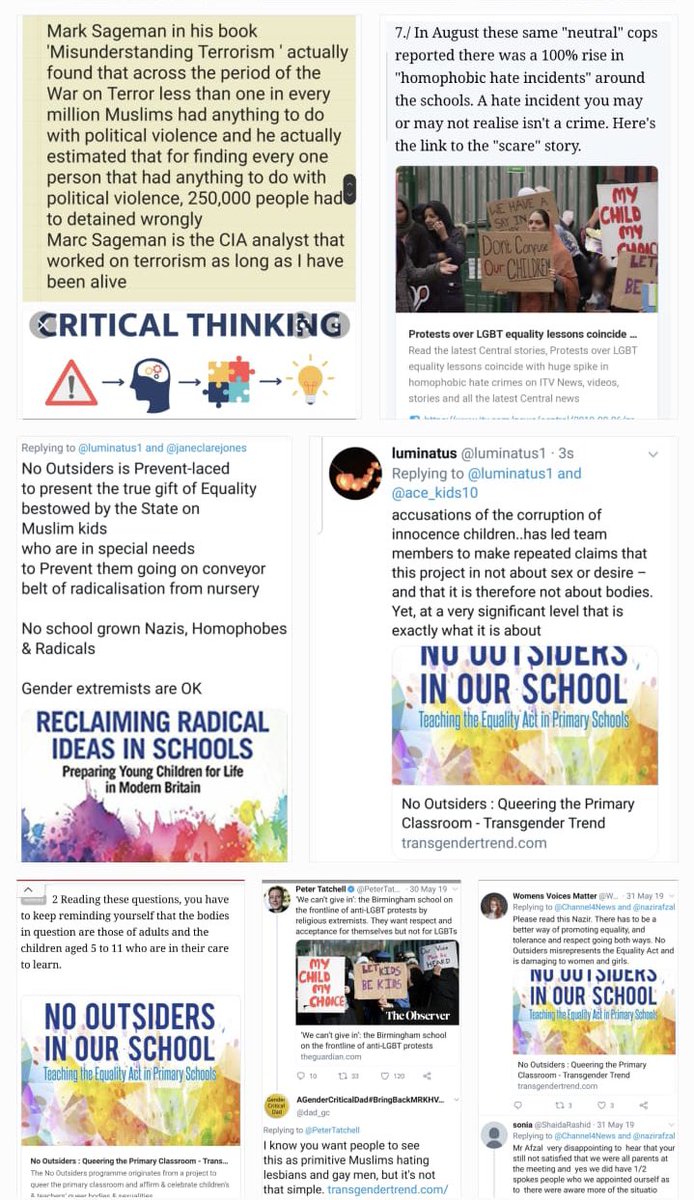
The ‘pre-emptive’ logic that informs Prevent & Channel interventions, with its goal of calculating future criminal (or in this case ‘terrorist’) risk,
forms part of a worrying wider trend toward ‘pre-emption’ whereby professionals responses are increasingly based on the
forms part of a worrying wider trend toward ‘pre-emption’ whereby professionals responses are increasingly based on the
whereby professionals responses are increasingly based on the expectation that individuals are likely to commit criminal acts in the future rather than they have already done so.
Channel is about safeguarding children and adults from being drawn into committing terrorist-related activity.
It is about early intervention to protect and divert people away from the risk they face before illegality occurs. (HM Government. 2012a: 4)
It is about early intervention to protect and divert people away from the risk they face before illegality occurs. (HM Government. 2012a: 4)
Significantly, the use of such pre-emptive logic prevents wider reflection on those conditions producing subjectivities (Burman, 2012).
In the case of young British Muslims, it shifts attention away from the impact of broader social & environmental factors on their lives,
In the case of young British Muslims, it shifts attention away from the impact of broader social & environmental factors on their lives,
it shifts attention away from the impact of broader social and environmental factors on their lives, namely ‘the impact of racism, Islamaphobia, social exclusion and everyday violence’ (Institute of Race Relations, 2010: 79).
Above all it denies young British Muslims social and political agency.
As argued by the Institute of Race Relations, ‘young people need to be empowered to engage politically and contribute to society, not made to feel that their opinions have to meet with official approval’
As argued by the Institute of Race Relations, ‘young people need to be empowered to engage politically and contribute to society, not made to feel that their opinions have to meet with official approval’
The concern must be that such policies and practices are likely to contribute to, rather than offset a sense of isolation, marginalisation and alienation amongst many young British Muslims.
Worryingly, this may have the potential to generate and deepen, rather than ameliorate, mental health issues in the name of offering mental health interventions.
Worryingly too, the pre-emptive pursuit of ‘no ungoverned spaces’ may not so much prevent radicalisation as
Worryingly too, the pre-emptive pursuit of ‘no ungoverned spaces’ may not so much prevent radicalisation as
Worryingly too, the pre-emptive pursuit of ‘no ungoverned spaces’ may not so much prevent radicalisation as the capacity of young British Muslims to engage in debate, evidence dissent, and grow into citizenship.
research.edgehill.ac.uk/ws/portalfiles…
research.edgehill.ac.uk/ws/portalfiles…
• • •
Missing some Tweet in this thread? You can try to
force a refresh




